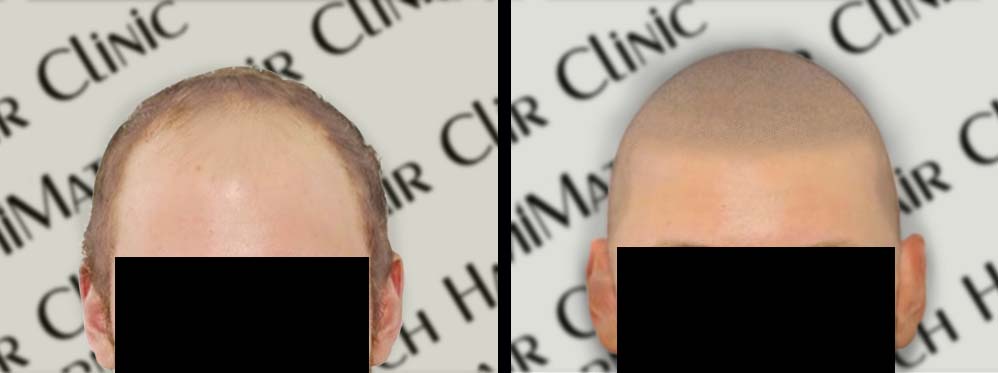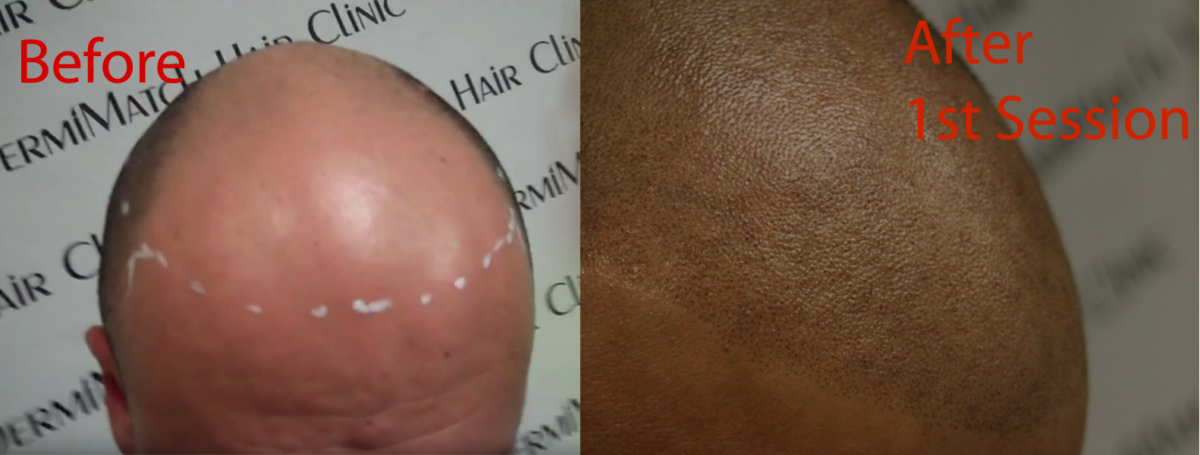Hair loss, or alopecia, can be a distressing experience, and autoimmune alopecia is a specific form that deserves attention. This condition occurs when the body’s immune system mistakenly attacks hair follicles, leading to excessive shedding. Unfortunately, it could transform into complete hair loss in some cases. There is no permanent treatment for autoimmune hair loss and SMP does offer hope.
Understanding Autoimmune Hair Loss and SMP Link
Alopecia may be of different types.
Alopecia Areata
The most common form of hair loss is characterized by patchy bald spots on the scalp, beard, or eyebrows.
The bald patches can be round, oval, or irregular in shape, and hair loss can occur suddenly or develop gradually.
In some cases, hair may regrow on its own, but the condition can become chronic with recurring episodes of hair loss.
Alopecia Totalis
Totalis involves complete baldness on the scalp. The hair loss usually progresses from alopecia areata, although it can sometimes develop on its own.
Alopecia Universalis
The rarest form, causing complete hair loss from the entire body, including the scalp, eyebrows, eyelashes, and body hair.
What are the Causes?
The exact cause of autoimmune alopecia remains under investigation, but researchers believe it involves a complex interplay between genetics and environmental factors. People with a family history of autoimmune diseases are at higher risk. Additionally, certain triggers like severe emotional stress or illness may initiate an immune response that attacks hair follicles.
Impact
Beyond the physical changes, hair loss can impact a person’s self-esteem, leading to anxiety, depression, and social isolation. Hair plays a significant role in self-identity and social interactions, and its loss can be a deeply emotional experience.
Autoimmune Hair Loss and SMP Treatment
While there’s no cure for autoimmune alopecia, various treatments aim to manage the condition and promote hair regrowth. This includes immunotherapy, corticosteroid injections, phytotherapy, and transplant.
Corticosteroids
Topical and injectable corticosteroids are used to suppress the immune system’s attack on hair follicles and promote hair regrowth. But you cannot ignore side effects of these treatments. Thinning skin and weight gain are some of the adverse effects with long-term use.
Immunotherapy
Treatments like oral or topical immunomodulators aim to modulate the immune system’s response and prevent further hair loss. These therapies can have potential side effects like fatigue, headaches, and allergic reactions, and may require ongoing monitoring.
Phototherapy
Exposure to specific wavelengths of light might stimulate hair regrowth in some patients with alopecia areata. However, this treatment may require multiple sessions and isn’t always effective for everyone.
Hair Transplantation
For individuals with extensive or permanent hair loss, hair transplantation can be an option to restore hair growth in affected areas. During the surgical procedure, healthy follicles are transplanted from a donor area of the scalp to the bald areas. However, it can be expensive and requires ongoing maintenance. No doubt, it is painful and requires long-term care and has a long recovery period as well.
Autoimmune Hair Loss and SMP as a Solution
While medical treatments focus on hair regrowth, scalp micropigmentation offers a non-surgical solution for individuals struggling with autoimmune alopecia.
SMP is a cosmetic tattooing technique that creates the appearance of tiny hair follicles on the scalp. It can be used to conceal patchy hair loss in alopecia areata. Besides, scalp micropigmentation helps create a full head of hair illusion for those with alopecia totalis.
The procedure involves using a specialized needle to deposit pigment into the scalp’s top dermis layer. It is effective for various forms of hair loss, including autoimmune alopecia, and can be customized to match individual needs and desired outcomes.
SMP is a minimally invasive procedure that involves using a specialized needle to deposit pigment into the scalp’s top dermis layer. The process is typically performed over multiple sessions to achieve the desired density and shade.
SMP offers long-lasting results that can typically last for several years with occasional touch-up sessions. It’s a low-maintenance solution that requires minimal aftercare. However, SMP could be a solution only when performed by scalp experts in Arizona.
DermiMatch Clinic understands the unique challenges faced by individuals with autoimmune alopecia. Our Arizona SMP technicians offer a comprehensive consultation process to discuss your specific condition, hair loss pattern, and desired outcome. Let us examine your condition and explore if scalp micropigmentation in Arizona is the way forward.
Schedule a consultation now.


